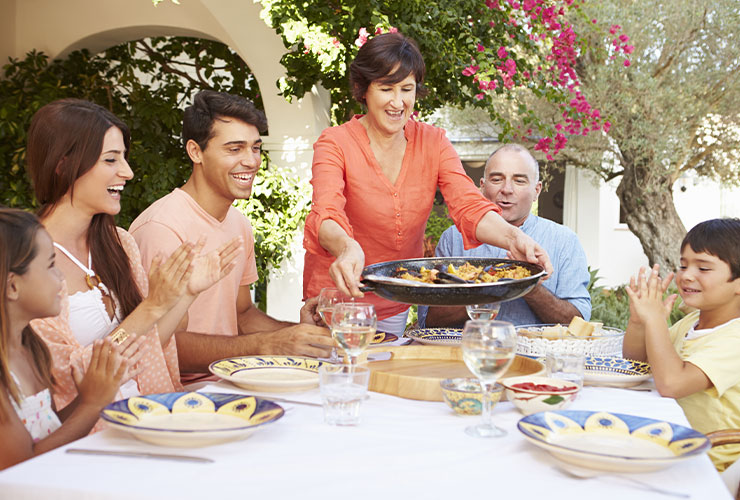Family in Italian You will agree that la famiglia, family in Italian, is the most important thing we all have.
Family in Italian is fundamental and plays a very important role in Italian culture and traditions. If you have watched any Italian TV series or comedies lately, you probably noticed how big the families portrayed in them are. There are i genitori (parents), called mamma (mum) and papà (dad), then i figli (children), le sorelle (sisters), i fratelli (brothers), gli zii (uncles), le zie (aunts), i cugini (cousins), i nonni (grandparents), an so on.
And this is just the beginning!
As you can see, the vocabulary around this topic is quite extensive: here you’ll find everything you need to speak about family in Italian and more!
Members of the family in Italian

Below, you will find all the useful words that you can use to talk about your family in Italian.
La famiglia
Let’s start with an easy one: famiglia, that stands for family! Make sure you pronounce correctly that gli (yee) sound.
Il padre
Or il papà, respectively the father or dad. As you may notice, the first alternative is more formal than the second one, like in English. When saying papà, make sure to put the accent on the last à, otherwise you will be saying Pope.
La madre
Or la mamma, respectively the mother or mom. As before, the former is formal, while the latter is more colloquial.
I genitori
When mentioned together, mamma and papà are i genitori (parents). Be careful not to confuse i genitori (parents) with i parenti (relatives)!
Il marito / la moglie
After getting married, your fidanzato (boyfriend/fiancé) becomes your marito (husband), while your fidanzata (girlfriend/fiancée) turns into your moglie (wife).
I figli
Il figlio and la figlia stand for son and daughter. When mentioning them both at the same time, they are called i figli. If there are two daughters, they are named le figlie instead. In case you are an only child, then you are un figlio unico or una figlia unica.
Il fratello / la sorella
Here is the translation for il fratello or i fratelli, the brother or brothers, and la sorella or le sorelle, the sister or sisters.
Before proceeding, if you want to improve your vocabulary I suggest you these books:
Relatives and extended family in Italian

Families living in Italy are usually very large, so it is important to know the name of every member of the family in Italian to avoid awkward situations.
Here we go:
Il nonno / la nonna
Il nonno and la nonna can be translated as grandfather and grandmother; when speaking about them both we call them i nonni (grandparents).
In case you are talking only about your female grandmothers, they are named le nonne.
Il / la nipote
Il nipote and la nipote stands for grandson and granddaughter.
As you can see, the word in Italian is the same, while the article is different.
Il bisnonno / la bisnonna
If you are lucky enough you also have il bisnonno and la bisnonna (great grandfather and great grandmother), that become i bisnonni (great grandparents) when speaking about them together. When talking about the female great grandmothers, you make reference to le bisnonne.
Lo zio / la zia
The brother or sister of your parents to you are lo zio and la zia (uncle and aunt). If you have more than one, they are gli zii and le zie (uncles and aunts).
Il cugino / la cugina
Il cugino and la cugina, namely cousin (male and female). For the plural they become i cugini and le cugine, which are respectively male and female cousins.
Il nipote/ la nipote
It may seem confusing, but the word nipote can mean nephew or niece as well as grandson or granddaughter. Usually we understand which word we are referring to by the context.
I parenti acquisiti

Let’s move onto the parenti acquisiti, the in-laws in Italian:
Il suocero / la suocera
The parents of your spouse will be to you il suocero and la suocera (father-in-law and mother-in-law).
When mentioned together they become i suoceri (parents-in-law).
Il genero / la nuora
To your suoceri you will be il genero or la nuora (son -in-law or daughter-in-law).
Il cognato / la cognata
The brother or sister of your spouse to you is il cognato or la cognata (brother-in-law or sister-in-law).
La famiglia allargata
When a married couple gets a divorce and then one of them gets remarried, he or she has the possibility to create a new family in which every member gets identified with a specific term:
Il patrigno / la matrigna – step father / step mother
Il figliastro / la figliastra – step son / step daughter
Il fratellastro / la sorellastra – stepbrother / stepsister.
I have to say that these terms often tend to be perceived as derogatory, so we prefer to say il marito di mia madre (my mother’s husband), la moglie di mio padre (my father’s wife) and simply use the terms sorella or fratello for siblings.
Definite articles with family in Italian

When we speak about the members of our family in Italian, we add a definite article and a possessive adjective before the noun we are referring to, except when it makes reference to a single family member.
Examples:
Il ragazzo biondo è mio fratello Francesco
The blond guy is my brother Francesco.
I due ragazzi là fuori sono i miei fratelli Mattia e Marco.
Those two guys out there are my brothers Mattia and Marco.
How to talk about your family in Italian?
Now that you know how to call all the members of your family in Italian, let’s see some typical statements that you can employ to talk about it!
| Italian | English |
| Dimmi qualcosa sulla tua famiglia! | Tell me something about your family! |
| Vivo / Abito con la mia famiglia | I live with my family |
| Quanti siete in famiglia? / Da quante persone è composta la tua famiglia? | How many of you are in your family? |
| La mia famiglia è composta da / Nella mia famiglia siamo | My family consists of |
| Che lavoro fanno i tuoi? | What do your parents do for a living? |
| Hai fratelli o sorelle o sei figlio unico? | Do you have any brothers or sisters or are you an only child? |
| Come si chiama tua sorella? | What’s your sister’s name? |
| Quanti fratelli o sorelle hai? | How many siblings do you have? |
| Quanti anni ha tuo fratello maggiore? E tua sorella minore? | How old is your older brother? And your younger sister? |
| Sei sposato/a? | Are you married? |
| Hai figli? Quanti figli hai? | Do you have children? How many children do you have? |
Common sayings about family in Italian

There are several sayings concerning family in Italian: here you will find some of the oldest Italian sayings, typical of the folk wisdom.
| Italian | Meaning |
| Mazze e panelle fanno i figli belli | This Neapolitan saying translates as “sticks and bread make beautiful children”. It means that to grow strong, respectful and good children you have to feed them well and put them in their place when necessary. |
| Tra moglie e marito non mettere il dito | This expression is translated as “don’t put a finger between husband and wife”, which is pretty self-explanatory: when it comes to a couple, mind your own business and stay out of it! |
| Volere la botte piena e la moglie ubriaca | This phrase is the equivalent of “wanting to have your cake and eat it, too”, which means wanting everything without giving up anything. |
| Aiuta i tuoi e gli altri se puoi | This statement means that family comes first, before everything and everybody else, and translates as “help your folks and then help the others, if you can”. |
| Parenti serpenti, fratelli coltelli | On a sadder note, this saying invites whoever is listening to beware of his or her relatives, especially the siblings. It can be translated as “relatives like snakes, siblings like knives”. |
| Natale con i tuoi, Pasqua con chi vuoi | This expression is quite bizarre and kind of funny because it says that basically you have to spend Christmas with your family but on Easter you can celebrate with whomever you want! |
| Buon sangue non mente | Translated as “good blood doesn’t lie”, it means that some good and valuable features of a son or daughter always come from the parents. In most cases, this phrase is quite offensive, so pay attention when applying it! |
Colloquialisms used to speak about family in Italian

Nicknames in -ino / -ina
When you are calling your little brother or sister, or you forgot to wash the dishes and you know your mom is going to be very mad at you, you could try to apply fratellino, sorellina or mammina, just to appease them.
Examples:
| Italian | English |
| E questa è la mia sorellina Ilaria! | And this is my little sister Ilaria! |
| Chi è la mammina più bella del mondo? | Who’s the most beautiful mommy in the world? |
Ma / Pa
Not so long ago, these two words came into use in colloquial Italian: they are the abbreviation of the words mamma and papa and generally employed by youngsters.
Examples:
| Italian | English |
| Ma, mi puoi dare un passaggio a scuola? | Ma, can you give me a lift to school? |
| A che ora comincia la partita, Pa? | What time does the match start, Pops? |
I tuoi / I miei
When you are referring to your parents or someone else’s, instead of using the extended form, you can just say i miei for i miei genitori (my parents) or i tuoi for i tuoi genitori (your parents). Alternatively, you can resort to the expression i miei / tuoi vecchi (my / your old parents), just to indicate your parents and not the fact that they are older than you.
Examples:
| Italian | English |
| I miei vorrebbero conoscerti. | My parents would like to meet you. |
| Domani ci vengono a prendere i tuoi? | Can your parents come and pick us up tomorrow? |
| Comunque i tuoi vecchi sono davvero fantastici! | Anyway, your parents are really great! |
Regional uses

As you already know, Italy has different regions which can have different traditions and ways to refer to family members.
Babbo
For example in Toscana (Tuscany) they use babbo instead of papà. That’s why we say Babbo Natale (Father Christmas).
Zi’, Fra
Nowadays it is very popular among younger generations to employ expressions like zio or zi’, fratello or fra, originally used only in Rome and now widely spread throughout Italy. They are mostly applied to address each other, even if they are not blood related, but just in a friendly and fun way.
Examples:
Ci becchiamo dopo fra!
We’ll catch up later bro!
Zi’, ti va di mangiare sushi stasera?
Dude, do you want to have sushi for dinner?
Most important festivities for Italian families

Here are some important festivities relating to Italian families:
Festa del papà (Father’s Day)
It is celebrated on 19th March. During this day, kids normally give something made with their hands to their daddies (e.g. handcrafted items and drawings). Some of them even prepare chocolates, sweets or read out poems, in Italian or in the local dialect, by heart.
Festa della mamma (Mother’s Day)
Italians celebrate Mother’s Day on the second Sunday of May.
As for Father’s Day, Italian children give handmade items and drawings to their moms. Others bake cookies, cakes or read out poems.
Festa dei nonni (Grandparents’ Day)
Grandparents’ Day, celebrated on 2nd October, has been established in Italy in recent years. Through this festivity the Italian government aims to enhance the important role of grandparents in the society and in Italian families. Actually, most kids in Italy spend their childhood at their nonni’s house. Furthermore, in lots of famous Italian TV shows you can find several references to grandparents and the significant help they give in raising their nipoti.
